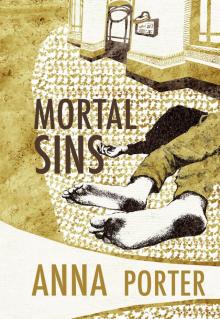- Home
- Anna Porter
Deceptions Page 16
Deceptions Read online
Page 16
He loved clothes. Today, he wore dark brown Hugo Boss chinos, a black wool jacket with a high collar that would have looked fine on a nineteenth century Hungarian aristocrat, and a pale pink shirt with long white cuffs that peered out of his jacket sleeves. On the table, there was a basket of rolls, an open bottle of red wine, and two glasses, one of which was already half empty. When he saw Attila, he poured wine into the other glass. “A modest Pomerol,” he said, “but you’ll be impressed with its pretensions. Sit. Please.”
“Why are you in Strasbourg?” Attila asked.
“And I thought you would be pleased to see me. Disappointing, dear friend,” Alexander continued in Hungarian.
“I am usually happy to see you, but I would be much happier if I knew what you are doing in Strasbourg,” Attila persisted, as he swallowed a mouthful of wine.
“You like?” Alexander inquired.
“It’s okay, but didn’t you know Strasbourg is famous for its craft beers? Please don’t tell me you are here for the wine.”
Alexander patted the plant and gazed at the ceiling next to the entrance. “You know it’s wired?” he said.
Attila saw the tiny camera next to the door. It was pointed at the kitchen area. “The door?”
“Yes, but it’s just an ordinary CCTV, more interested in who is coming and going than in us.”
“The plant?” Attila asked.
Alexander hummed. “I think I got that earlier,” he said. “but there must be more. This city lives on information. All those Europeans can’t resist their desire to know more than other Europeans and the rest of us, who are not in the ‘club.’ All those groups, all those secrets they try to hide from one another and the press. The jockeying for positions.”
“Is that why you’re here? To find out what the Council of Europe is planning?”
“Not the Council,” Alexander said. “We have someone else on that. I am sure you’ll like the veal here. It’s not as spicy as in Budapest, but it is excellent. The boeuf bourguignon is a specialty of the maison.”
Attila didn’t respond. He stared at Alexander and waited while the maître d’ hovered and his friend ordered — in perfect French — the “boeuf bourguignon avec le choucroute pour deux personnes.”
“We have a problem,” Alexander began. “It’s about a woman who is a master of martial arts, a talented fighter with an uncanny ability to spot Renaissance art and to distinguish between the real and the fake. She is not so discerning about people, but hey, I am happy for you both, long as you keep her well away from me and everyone I report to, because some of us are not keen on having our balls shot off.”
“She didn’t.”
“That’s not what I heard, and I had my information from the guy who was shot. Poor bugger, he shat his pants when she shot him. I got there the same time as the ambulance. Not a pretty scene.” Alexander finished his wine in one gulp and refilled his glass. “There was blood everywhere and he was crying and the stench . . . you can imagine. They got him undressed and this doctor who didn’t speak Russian tried to tell him in Hungarian that he had lost only one, that he could still have children, if he wanted. All that before the guy passed out from the pain, and I doubt he would have been thinking about having children just then.” He drank a bit more wine and tore a bit of bread from one of the rolls in the basket. “I waited in the hospital till they stitched him up. That’s when he told me he had been attacked by a woman.”
“There are a lot of women in Budapest,” Attila said.
“Yes, and some of them are still holding a bit of a grudge against Russians — I don’t blame them, really — but very few of them could get into a fight with a trained man and win.”
Still admitting nothing, Attila gazed at the CCTV camera with a vague smile.
“I know it was her, so why not cut the crap, stop playing around, and let’s talk about this thing as if we were adults.”
“What makes you think it was her?” Attila persisted.
“She showed the guy a drawing she had made of someone involved with this art thing in Strasbourg. It was a pretty good likeness. The woman can draw. Better than what the Russian guy had, and there was no mistaking this is the man who shot the lawyer in Strasbourg.”
“And this man, does he work for you?”
“Neither man works for us, but the man who now has one ball does work for one of our beleaguered country’s good friends, a very refined Russian who is close with our czar and hates this sort of violence. He is, after all, an art collector. You remember, he was trying to buy that Titian. He likes fine old paintings.”
“And his man. FSB?”
“Used to be. Retired.”
“He was sitting in a car outside the home of our minister of industry and commerce. Why?”
Alexander grinned. “Perfect. You’ve been talking with that imbecile, Tóth. What else did he tell you?”
“That you’re flying the damaged FSB thug back to Moscow.”
“Careful, my friend, not all FSB men are thugs. I, for one, . . .”
The maître d’ served the boeuf with a Gallic flourish, checked the bottle of wine, raised an eyebrow to Alexander, who nodded, then tactfully departed.
“Okay, noted,” Attila said. “I assume you’re flying him back because you don’t want him to talk to us?”
“Mr. Grigoriev wants him to get the best care and that would not be in Budapest. Our hospitals are not what they should be, but yours, my friend, defy reason. They are filthy, overcrowded, understaffed, and brutish. Mr. Grigoriev would not send his dog to one of them, he said, and I am sure he said the same thing to your minister of health if you still have one.” Alexander dug into his food with the enthusiasm of a man long deprived and made small appreciative sounds.
“There would be no point in his talking to either Tóth or you. It’s the kind of conversation that could deteriorate into a diplomatic incident, and we all know that your pocket dictator has been cozying up to our czar every chance he gets. The czar appreciates it, of course he does, someone in the European Union can have influence, but don’t believe for a minute that he wouldn’t squash your little fellows — kicsi emberek — if he was irritated. And this sort of nastiness could irritate him.”
The second bottle of Pomerol arrived. Alexander sniffed the cork, swirled the wine around in his glass, tasted, and gestured to the waiter to pour. The thought of Alexander’s childhood flashed through Attila’s mind. He would have had to learn all this ostentation after he left his one-room home with its outdoor privy and single stove for cooking and heating, but he had learned it much better than Attila had.
“Can you say what he was doing in front of our minister’s house?” Attila asked.
“He was waiting for the archery expert to show up.”
“At that house?”
“That house was one of the options. Yes.”
“The other?”
“Another house belonging to another minister down the street from this one. And before you ask, no, he was not planning a friendly chat with him.”
“Why?”
“Why? Because Mr. Grigoriev was not pleased about the murder of the lawyer and wished to find out who ordered it and why. A simple inquiry, but he didn’t get his answer because your beloved decided to shoot off one of his man’s balls.”
“Grigoriev didn’t hire the shooter?”
“Obviously not. Hence his interest in finding out who did.” Alexander finished his wine, poured some more into Attila’s glass, pushed away his empty plate, and fished a gold-tipped, black cigarette from his breast pocket. A Sobranie, his preferred brand, increasingly hard to find despite its nod to the cancer scare: only 7 milligrams of tar.
“There is a no smoking sign,” the maître d’ protested.
“I know,” Alexander said. “And there are no diners here except for me and my friend, and we wi
ll leave in two minutes. With the cigarette and without the brandy, if you insist.”
The maître d’ didn’t insist.
“I assume your lover is interested in the same thing,” Alexander said.
“She is not my lover,” Attila said.
“Your once and future lover, then,” Alexander said. “Or did you think we didn’t know? That would be unusually simple of you. We like to know where you are and what you are doing, even when you think you are alone.”
“Why in lófasz would I be of interest to the Russian government? I am not even of interest to my own government.”
“Never mind that, Attila, I was only answering your earlier question: how I knew you were here. And it didn’t take much effort to know gospozha Marsh was here too; the local police have the videos. She chased the shooter. She almost caught up with him along Rue de Dôme. Did you know she signed up for archery classes in Colmar? No? She doesn’t share much, does she? I assume you saw her in Budapest yesterday? Did you know what she was doing there?”
Attila stared at the CCTV camera in the corner by the door.
“You can relax,” Alexander said. “I took care of that already.”
“I assume she was chasing the same man,” Attila said. “She must have known he was in Budapest.”
“Interesting,” Alexander said. “If she knows his name by now, that puts her ahead of our Grigoriev and his highly paid staff. They know some of his connections but still don’t have a name. And one more question: does she still think she is working for Madame Vaszary?”
Chapter Twenty
“Adam Biro,” James said when he finally succeeded in reaching Helena. He had been trying her cellphone (leaving messages), the Hôtel Cathédrale (“Sorry, she checked out”), and Louise (“She will call you as soon as she can”) to no avail. “An interesting post-Communist case. He seems to have done well in every era, but capitalism was particularly kind to Mr. Biro.”
“Did he have a lot of paintings?”
“According to my source in Vienna, he had more than a hundred. He even managed to sell a few to legitimate galleries. A Verrocchio Virgin in Stockholm, a Corot and a Renoir in Vienna, a Rippl-Rónai in Prague, some Rembrandt drawings in New York. I assume there were more.”
“Didn’t the government wonder how he got his loot?”
“I’ve no idea. But we know that in recent years he continued to sell more paintings through a guy called Kis in Budapest.”
“Ferenc Kis?”
“You know him?”
“Met him a year or so ago. He was involved in the sale of a Titian that had been traded for a crust of bread in the Gulag. I wouldn’t trust anything he says.”
“In this case, that would have been wise advice to give Biro. One day he just disappeared, no one’s seen him again.”
“And the collection?”
“I assume it’s still there. A few pieces are sold every year and, eventually, much like the man himself, it will all be gone. Frankly, I doubt he would have had a baroque masterpiece, if that’s why you are interested in him. A Gentileschi would have been hard to hide.”
“Is there a record of a Gentileschi sold sometime, years ago, to a Hungarian collector?”
“The closest I can come to a record of a painting by Artemisia in eastern Europe is a self-portrait seen in Warsaw before the war. Some nobleman, later executed by the Germans, had one that he had not wished to sell to Göring. So you think the painting in Strasbourg is a real Gentileschi?”
“Still not sure,” Helena said.
“Your tests at Arte Forense confirmed it’s the right era?”
“As far as we can tell.”
“We?”
“Andrea Martinelli and I tested the paints used, and the canvas. Trouble is, some of the best in the fakes business have been known to use old canvases and make their own paints from the same basic materials.”
“Would your client allow us to do more tests?”
“No. They want a quick opinion and a sale.”
“Please tell them we could handle the sale. We have the expertise and the experience. We are the best in the business and would get them more money than if they go on their own.”
“James,” Helena said, “I don’t need a sales pitch. I will let you know what they decide.”
She had been wondering who was selling off Biro’s collection and where the money went. The old guy in fuzzy slippers Attila had met? Unlikely. Berkowitz, the archer? Very unlikely. Could he have been hired by one of the men in Rózsadomb? If so, why?
* * *
There was only one Gyula Berkowitz listed at a Buda address. Another tree-lined street with well-kept houses, smaller than the ministers’ houses but very nice. Berkowitz had part of a duplex with shared stairs, separate outside entrances, small side gardens, low fence, high windows. His side had a red-painted door, drawn blinds; the other had a couple of half-open windows and a brown door with a mezuzah on the side.
Helena rang Berkowitz’s doorbell. The sound echoed inside the apartment. Few carpets and not much stuffed furniture to muffle sounds, she thought, and waited. She tried the bell again, then knocked on the door loud enough that she assumed the neighbours would hear. Still no one came.
She rang the neighbour’s bell and, judging by the time it took for the response, the woman who answered must have been standing an inch from the door, looking out, waiting to see what would happen. “Nincs otthon,” he is not at home, she said.
“He doesn’t seem to be at home,” Helena said in English.
They regarded each other for a moment, before the woman said in English, “You are not Hungarian.” She was short, just over five feet, with a big curly black hairdo that added some height. She wore a knee-length burgundy dress, matching lace-up shoes, and a lot of makeup for an at-home afternoon.
Helena smiled. “No. I am American,” she trilled, inhabiting Marianne Lewis’s personality, “I have come such a long way to see him. Very, very disappointing to say the least. I cannot imagine flying all the way home to New York without seeing him. Any idea when he will be home?”
“New York,” the woman repeated.
Helena stretched out her hand. “Marianne Lewis,” she announced.
“Zsuzsa Klein,” the woman said, shaking Helena’s hand. “That’s ‘Susan’ where you come from. We haven’t seen your friend for some time now.”
“Days?”
“Two weeks, at least.”
“He didn’t happen to say where he was going?”
“Not really,” Zsuzsa said after a moment’s hesitation.
“But you have guessed?”
“I thought he may have gone to France. He travels a lot, and sometimes he asks me to pick up his mail. You know how it is: when your mail sits outside, people know you’re away, and someone could try to break in.”
Helena nodded. “So you have been keeping his mail for him.”
“No. We put it inside. But I noticed he hasn’t touched it in a long time, and a couple of small packages looked like they were from France.”
“That’s why you thought he was in France?”
“I thought perhaps he had bought a few things and sent them home so he wouldn’t have to carry them.”
“Oh.”
Zsuzsa hesitated before she asked, “You are a relation?”
“Only a friend,” Helena said with a small pout. Given the upper lip enhancement that being Marianne required, she could manage only a very small pout. “Gyuszi said he would be here.” Vargas had called him Gyuszi — that being the diminutive of Gyula. “Perhaps, if it’s not too much trouble,” she asked, “you would let me have a look inside. He had invited me to stay at his place. Maybe there is a note or something for me. Like I said, he was expecting me to come. . . .”
“I didn’t see a note,” Zsuzsa said.
�
��He was” — Helena stressed the “was” — “really expecting me.”
“Hmm.”
“All the way from New York.”
Zsuzsa rattled some keys in her pocket, selected one from a key ring, and opened the red door. She stepped back to let Helena in, and followed close on her heels.
The apartment was all open concept, airless, and smelled of disuse and disinfectant. Someone had cleaned the black-and-white tile floors and the clear plastic-backed chairs, the low plastic-top table. There was one angular brown sofa that occupied the living area. In the middle, under the table, a brown woven rug. The walls were beige. No paintings, no books, nothing that suggested someone had enjoyed relaxing here. A set of shelves with a few photographs, face down, and a copy of Dernières Nouvelles d’Alsace from three days ago, a photograph of the murdered lawyer on the front page.
Helena murmured something about the photographs and wondered loudly, for Zsuzsa’s benefit, whether he had a picture of her, and she leafed through the black-and-white photos. One of the lawyer Magoci at an outdoor restaurant table, laughing and talking with a young woman; one of Gizella Vaszary and her husband also laughing; and another of herself half-turned toward the River Ill, close to the tickets kiosk.
There was a neat stack of mail, a local newspaper, a brown paper package, and some flyers on a side table.
“Has he lived here a long time?” Helena asked.
“About a year, I think. We hardly ever see him. He doesn’t have guests. Doesn’t entertain. We asked him once what he did for a living.”
“What did he say?”
“He didn’t. And I thought he disliked my asking. He is very . . . how you say . . . reserved. We try to be friendly,” Zsuzsa said. “He thought my asking him was intrusive. Did you say you were friends?”
“Yes,” Helena said with as much gusto as she could manage.
“Here he seems to have no friends. As I said, no visitors. Twice we saw a car stop, he came out, and it picked him up, but we didn’t see the driver. The car had those tinted windows. One of those big black cars. Mercedes, maybe. We wondered if there was something going on with him.”

 Deceptions
Deceptions Hidden Agenda
Hidden Agenda The Appraisal
The Appraisal Mortal Sins
Mortal Sins In Other Words
In Other Words